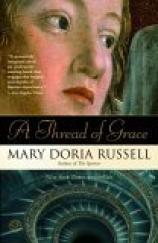A Thread of Grace
Review
A Thread of Grace
I'm a Jew from a family so assimilated that I never set foot in a synagogue until I was almost 40. Yet it is part of my identity in a way that has nothing to do with religious observance, and throughout my life it has struck me with particular force when confronting the Holocaust --- reading Anne Frank's diary; seeing the movie Judgment at Nuremberg; weeping at Yad Vashem, the museum and memorial in Jerusalem. Being Jewish makes me feel proud, different, and vulnerable all at the same time.
A THREAD OF GRACE is part of that tragic narrative, but a more obscure one. Set in the ports and valleys of northwestern Italy (Aosta, Piemonte, Liguria) during the last two years of World War II, it tells the story of Jews, 43,000 of them --- both native-born Italians (of which there were many; the Jewish community in Rome is the oldest in Europe) and refugees from eastern Europe --- whose lives were saved by ordinary citizens. Russell, who calls herself "a Jew by choice and an Italian by heritage" (she is a convert, though she doesn't give details), seems the ideal writer to bring this piece of history to life, and she does it beautifully in an absorbing, generously proportioned novel.
This is the kind of book you need to read with a cheat sheet because there are so many personalities and interwoven story lines (Russell considerately provides a cast of characters; I could have used some maps, too). There are the Italian Jews, particularly the chief rabbi, Iacopo Soncini, and his wife, Mirella; and Renzo Leoni, a hardened former pilot who has as many identities as he has scars, and his mother, Lidia. There are the Italian Catholics: priests, nuns, and ordinary farmers and peasants who help shield the Jews --- and a big, innocent Calabrian infantryman who marries one. There is the Jewish refugee contingent, especially a Belgian teenager named Claudette Blum --- families who, as the story opens in 1943, are making their way across the Maritime Alps from southeastern France to Italy, which has just surrendered to the Allies. Unfortunately, Italy only seems safer: Mussolini's ouster sets up two years of bitter fighting among Germans, Allies, and partisans. A British Special Ops signalman parachutes in to gather information on the ground. Nazi officers try vainly but brutally to stabilize the area for Hitler. And a renegade German doctor, Werner Schramm, who presided over the vilest concentration camp experiments, is slowly dying of guilt, drink, and tuberculosis.
The book is, I admit, a bit heavy on "types" familiar from World War II movies: the selfless religious, the noble peasant, the apparent cynic who is a secret hero, and so forth. Indeed, there is an old-fashioned flavor to the whole novel --- the way Italian or German or Hebrew words are thrown in to indicate which language is being spoken; the stately pace; the headings that tell you precisely where and when the action is taking place. A THREAD OF GRACE doesn't reinvent the war novel as THE ENGLISH PATIENT did, with its spare language and mysterious shifts between myth and reality, past and present. But the author's emotional commitment to her characters is such that they soon grow on you, transcending cliché and laying claim to your heart.
Russell was originally a paleoanthropologist --- a scientist who studies human fossils --- and the training shows in her meticulous portrait of the region and its people. Although her previous books, THE SPARROW and its sequel, CHILDREN OF GOD, are science fiction, the methodology was similar: She invented an entire alien culture, building it up in brilliant, believable detail. (These earlier works, by the way, are fascinating, suspenseful, and altogether wonderful; grab them even if you don't ordinarily like the genre). There is a scientist's mind at work here as well as a novelist's imagination.
There is also a challenging ethical complexity to A THREAD OF GRACE. Russell does not preach or sentimentalize (which is easy to do in the face of the Italians' courage and self-sacrifice), and she doesn't glorify war; rather, she underscores its moral ambiguities. Werner Schramm, for example, is a walking, talking human monster, but he began as an idealist. Renzo Leoni is guilty of killing civilians, too, though on a lesser scale: In 1935, during the Italian-Abyssinian war, his squadron famously bombed a civilian hospital, and he is tortured by the memory. When local partisans show no mercy to captured Nazi officers, Renzo knows the massacre is wrong, but unstoppable. "I've sworn off ethics," he says afterward. "What's the point?" A THREAD OF GRACE, like THE SPARROW and CHILDREN OF GOD, is powerfully (though not didactically) imbued with a plea for cultural and religious understanding --- to respect what is radically different in other societies and faiths, while embracing what we have in common.
The evocative title comes from a remark by Rabbi Soncini at the book's end. "There's a saying in Hebrew," he says. " 'No matter how dark the tapestry God weaves for us, there's always a thread of grace.' " Mary Doria Russell's novel is a bit like a great textile --- rich and broad and intricately figured --- and in its design there is a glint of something like hope. These days, we could use it.
Reviewed by Kathy Weissman on January 23, 2011
A Thread of Grace
- Publication Date: December 6, 2005
- Genres: Fiction, Historical Fiction
- Paperback: 464 pages
- Publisher: Ballantine Books
- ISBN-10: 0449004139
- ISBN-13: 9780449004135










